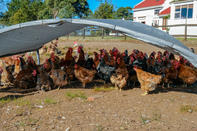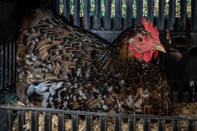
Food and Water
The feed may become a stressor if there is not enough, it is out of reach, there is too much competition for feed, feed particles are too fine or coarse, or the feed is high in salt. Any of these will have a negative impact on feed intake, resulting in birds having less energy to ward off diseases. The mouldy feed also contains poisonous substances that can suppress the immunity of birds.
The same applies when birds do not have access to enough water, or if the water is too hot or of a poor quality. According to the South African Poultry Association, dehydration will not only cause stress but also dry-out the respiratory tracts of birds, easing the penetration of disease-causing organisms. Dirty water is also a threat as it may contain a large variety of disease-causing organisms as well as bacteria that can weaken the immune system.
Environmental Factors

Lighting may become a stressor when birds do not have enough dark time to rest. According to the World Health Organisation, birds should also be given enough time to adapt to switches in day length manipulations during different stages of production as well as during daily switches from darkness to light and light to darkness. Lighting should be evenly dispersed, with no dark spots in between, to prevent overcrowding in brightly lit areas.
Climatic conditions and air quality may also be a challenge. It might be wise to choose breeds that perform better under warm climatic conditions, such as some of the indigenous breeds or naked necks, if birds will be produced outside in a region that is relatively warm. Extra care should then be taken to ensure the birds have access to enough shade and water and to prevent heat from having a negative impact on feed intake.
Cold stress has a negative impact on bird health because it results in birds needing more energy to stay warm. An easy way to identify whether birds are experiencing heat or cold stress is to look at their behaviour: Birds that are cold will crowd together to keep each other warm. They will also eat more than usual to make up for the energy they have lost in an attempt to keep warm.
Birds suffering from heat stress tend to pant and have laboured breathing. They will lift their wings and move away from other birds to keep cool and may become lethargic. Severe heat stress may lead to diarrhoea as well as seizures or convulsions.
When produced in poultry houses, climate control can be used to raise and lower temperatures and humidity levels. Special care should be taken to prevent over or under ventilation. The trick is to provide enough ventilation to allow moisture to move, but at the same time to avoid drafts.
Poor moisture removal from bedding material will lead to higher levels of ammonia and in turn, lead to a higher risk of respiratory diseases. If conditions in the poultry house are too dry, there is also a bigger chance that birds will become irritated by dust.
Exposure to Diseases and Disease Causing Vectors
Poor sanitation or pest management may cause stress by exposing birds to wild birds, rats, mice or flies. These animals will not only bother the birds but also present huge disease risks. Birds may also be stressed because they are ill, which is referred to as pathological stress. To reduce this stress and prevent serious complications, birds should be treated as soon as possible.Personal Space and Handling

Signs of Stress
The following are signs that birds might be suffering from stress:
Aggression and fights
Feather plucking or shedding
Changes in appetite – birds eating more or less than usual
Lethargy or birds being sluggish
Weight loss
Drop in egg production for layers
Diseases